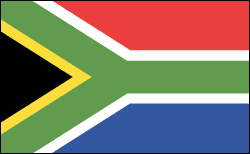South Africa History


South Africa's Independence is Tarnished by Apartheid
Jan Christiaan Smuts brought the nation into World War II on the Allied side against Nationalist opposition, and South Africa became a charter member of the United Nations in 1945, but he refused to sign the Universal Declaration of Human Rights. Apartheid—racial separation—dominated domestic politics as the Nationalists gained power and imposed greater restrictions on Bantus (black Africans), Asians, and Coloreds (in South Africa the term meant any nonwhite person). Black voters were removed from the voter rolls in 1936. Over the next half-century, the nonwhite population of South Africa was forced out of designated white areas. The Group Areas Acts of 1950 and 1986 forced about 1.5 million Africans to move from cities to rural townships, where they lived in abject poverty under repressive laws.
South Africa declared itself a republic in 1961 and severed its ties with the Commonwealth, which strongly objected to the country's racist policies. The white supremacist National Party, which had first come to power in 1948, would continue its rule for the next three decades.
In 1960, 70 black protesters were killed during a peaceful demonstration in Sharpesville. The African National Congress (ANC), the principal antiapartheid organization, was banned that year, and in 1964 its leader, Nelson Mandela, was sentenced to life imprisonment. Black protests against apartheid grew stronger and more violent. In 1976, an uprising in the black township of Soweto spread to other black townships and left 600 dead. Beginning in the 1960s, international opposition to apartheid intensified. The UN imposed sanctions, and many countries divested their South African holdings.
Apartheid's grip on South Africa began to give way when F. W. de Klerk replaced P. W. Botha as president in 1989. De Klerk removed the ban on the ANC and released its leader, Nelson Mandela, after 27 years of imprisonment. The Inkatha Freedom Party, a black opposition group led by Mangosuthu Buthelezi, which was seen as collaborating with the apartheid system, frequently clashed with the ANC during this period.







